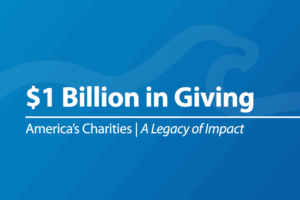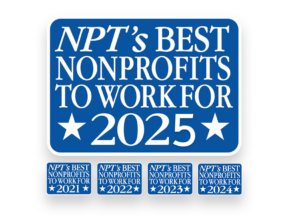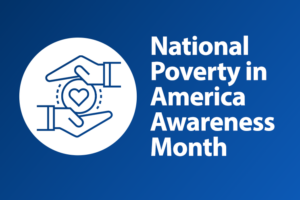Ronita Mohan, Venngage | January 20, 2021
5 Nonprofit Trends to Boost Fundraising Efforts in 2021
The nonprofit trends of 2021 are a direct result of the events of 2020, especially the COVID-19 pandemic.
We are seeing a clear move towards digital channels, human connections, and increased flexibility, mainly because of the increase in remote working.
Below are the five nonprofit trends for 2021, with tips on how organizations can adapt to them.
Nonprofit Trend #1: Digital Fundraising
Nonprofits have successfully used online channels for years, but it became the primary method of communication in 2020, thanks to social distancing. Many nonprofits successfully engaged their donors online last year, which is why we can expect digital fundraising to remain at the fore in 2021. Learning how to better convert that digital engagement into dollars raised will become a key nonprofit trend for the next few years.
These Giving Tuesday campaign examples showcase the power of digital media.

Numerous organizations created gift matching drives and hashtag campaigns, and used live video and paid social media ads to reach even more donors and increase revenue.
Nonprofits will need to continue their strong social media presence this year. Actively engage with your community by encouraging comments and encouraging conversations with supporters.
Use social scheduling tools — many of which are free — to post regularly and measure success through platform analytics. You can also learn the best time to post to get the most engagement through these tools.
Email marketing is another area that nonprofits can utilize to retain donors. Despite the i788ncreased emphasis on two-way, social communication, emails are still the number one way to reach your audience. Sending regular emails is a great way to keep donors informed and connected to the organization.
A nonprofit blog is a great way to keep donors updated on what your organization is doing and to highlight the causes you are working on—these blogging tips will help you get better engagement.
Nonprofit Trend #2: Share Your Impact
We have written about the importance of transparency for nonprofit fundraising during a crisis and this is a trend that is going to continue well past 2021.
Nonprofits will face unexpected challenges this year, as will their supporters. To ensure that donations continue to come in, organizations will have to add value to their donation appeals.
There are numerous nonprofits around the world, all vying for attention from prospective donors. The way to win them over is to show how your organization is making an impact. And that’s the key – it’s about showing, not just telling.
Explain where their money is going and the real people you are helping using a range of information: data, stories, testimonials, images, etc. Let your supporters know how close you are to reaching your mission-driven goals and share stories from the people you’ve helped. Just be sure to get permission from your beneficiaries before you pass it on!
You can highlight how the support of your donors can directly impact your goals, like the New Zealand SPCA does on their homepage.

Be transparent about your nonprofit’s goals and needs this year—it will make it easier for donors to understand how their donations are being used and the impact they can make.
Nonprofit Trend #3: Flexible Strategies
The nonprofit sector, thanks to tighter budgets and fewer resources, has always had to learn on the go, but 2020 proved that flexibility is incredibly important. By preparing for the worst, nonprofits can be prepared to handle anything that comes their way.
The way nonprofits work has changed due to the pandemic—remote teams are now more common, and that impacts the inner workings of organizations.
Being flexible with how your employees work, whether in-house or remotely, will be a priority in 2021.
But fundraising strategies will also need to be flexible—you can’t put all your eggs in one basket. In other words, diversify the ways in which you generate revenue.
If you’ve been fundraising primarily through web donations, consider running crowdfunding campaigns, virtual events, or peer-to-peer campaigns. Workplace giving in particular is a method that has gained popularity during the pandemic. These programs not only engage employees and become the virtual watercooler around which teammates connect, but they also help employees feel connected to their jobs and the community.
Keep your options open and have a backup plan so you can adjust depending on the environment.
Nonprofit Trend #4: Recurring Donations
One-off donations are helpful but they require more work, which often means there’s little to no return on investment (ROI). Each new supporter has to go through the entire donor journey until they finally donate.
This requires introducing them to your cause and proving to them that your nonprofit is worth their hard-earned money. It is a long process that results in a single donation.
Consider the special #GivingTuesday campaign. There is no doubt that many nonprofits build a successful strategy around that day of giving. However, did you know that workplace giving, which is a recurring giving campaign via payroll contributions, generates nearly 10 times more in funding for nonprofits annually than #GivingTuesday? Check out this America’s Charities article for the details.
Recurring giving enables nonprofits to plan for funding all year-long and it’s easier on a donor’s bank account. Many donors actually give more over the long-term when they can donate a small amount of each paycheck to a charity they love, rather than one whopping donation. Bottom-line, recurring giving benefits the nonprofit, donor, AND the people being served by the nonprofit.
A new donor’s second contribution is called the “golden donation.” It’s hard to get your new supporters to make a second contribution and yet, per the statistics below, it’s worth the effort. Nonprofits who focus on receiving that golden donation naturally increase their average donor retention rate (about threefold!) because of this higher repeat retention rate.

Consider asking existing one-time donors to change to recurring by showing them how much they have helped your organization, and pointing to how much more they could be doing with a longer-term investment.
Make it easy for donors to set-up automatic donations on a set date every month, and make sure the receipt is automatically available or emailed directly to them.
Recurring contributions began trending long before 2020, but physical distancing emphasized its importance. The focus on regular, recurring donations will only strengthen throughout 2021 and beyond. Indeed, a larger percentage of donors enrolled in recurring programs during the pandemic.

Nonprofits can look into building landing pages that attract and retain donors and invest in donor management systems to process donations.
Nonprofit Trend #5: Virtual Events
With more people spending time online for work, entertainment, and philanthropy, virtual events are one of the biggest fallouts of the pandemic.
In-person meetings are possible now only under strict health restrictions, making virtual fundraising the go-to method for most nonprofits, like this live stream from the Toronto Centre of Learning & Development.
There are benefits to going virtual for events—you can build a virtual team that allows you to tap into a global audience. This opens up fundraising resources heretofore untapped.
Virtual events also allow more diverse audiences to attend fundraisers. Attendees don’t have to concern themselves with traveling distances, hotel stays, or taking time off from work.
Organizations also cut down on the cost of securing venues, food, transportation, etc.—though they continue to be a consideration for hybrid events that include virtual and in-person elements. Of course, it’s important to invest in virtual events to ensure a positive experience, so nonprofits still need to set aside a budget for events. But thankfully, that budget doesn’t need to be quite so hefty in a virtual environment.
Key Takeaways: Go Digital to Adapt to the Nonprofit Trends of 2021
2020 changed the way the world works and it has impacted nonprofits in ways that will continue over the next few years.
Five of the biggest nonprofit trends of 2021 are:
- Digital fundraising
- Sharing your impact
- Flexible strategies
- Recurring donations
- Virtual events
By adapting to these trends, nonprofits will be able to reach and retain more donors and fundraise better.
Ronita Mohan is a content marketer at Venngage, the online infographic maker and design platform. Ronita regularly writes about digital marketing, nonprofits, and small business growth. Twitter: @Venngage
Cover image: Photo by Jungwoo Hong on Unsplash

Get Resources and Insights Straight To Your Inbox
Explore More Articles
$1 Billion in Giving: America’s Charities Reaches a Historic Milestone
A testament to the impact of mobilizing the power of giving. We have some extraordinary news to share. In 2025, America’s Charities crossed a threshold that few organizations…
America’s Charities Named ‘Best Nonprofit To Work For’ For Fifth Consecutive Year
Washington, D.C. – April 1, 2025 – America’s Charities, the nonprofit that mobilizes the power of giving as a leading provider of volunteering, workplace giving,…
Get Resources and Insights Straight To Your Inbox
Receive our monthly/bi-monthly newsletter filled with information about causes, nonprofit impact, and topics important for corporate social responsibility and employee engagement professionals, including disaster response, workplace giving, matching gifts, employee assistance funds, volunteering, scholarship award program management, grantmaking, and other philanthropic initiatives.





